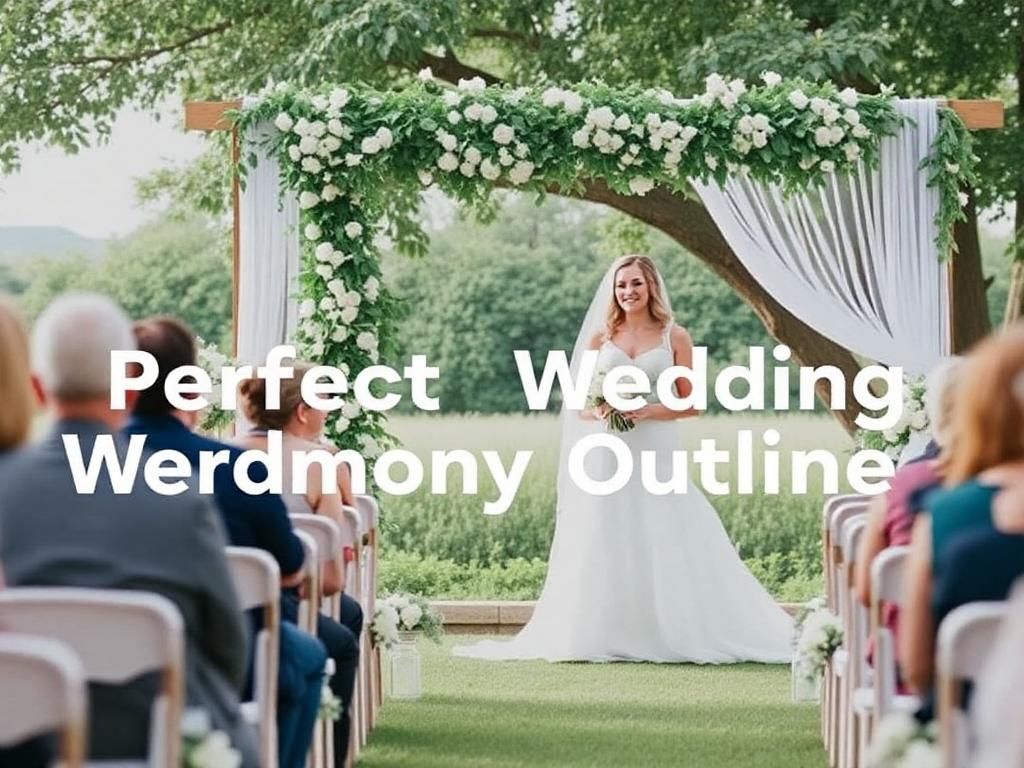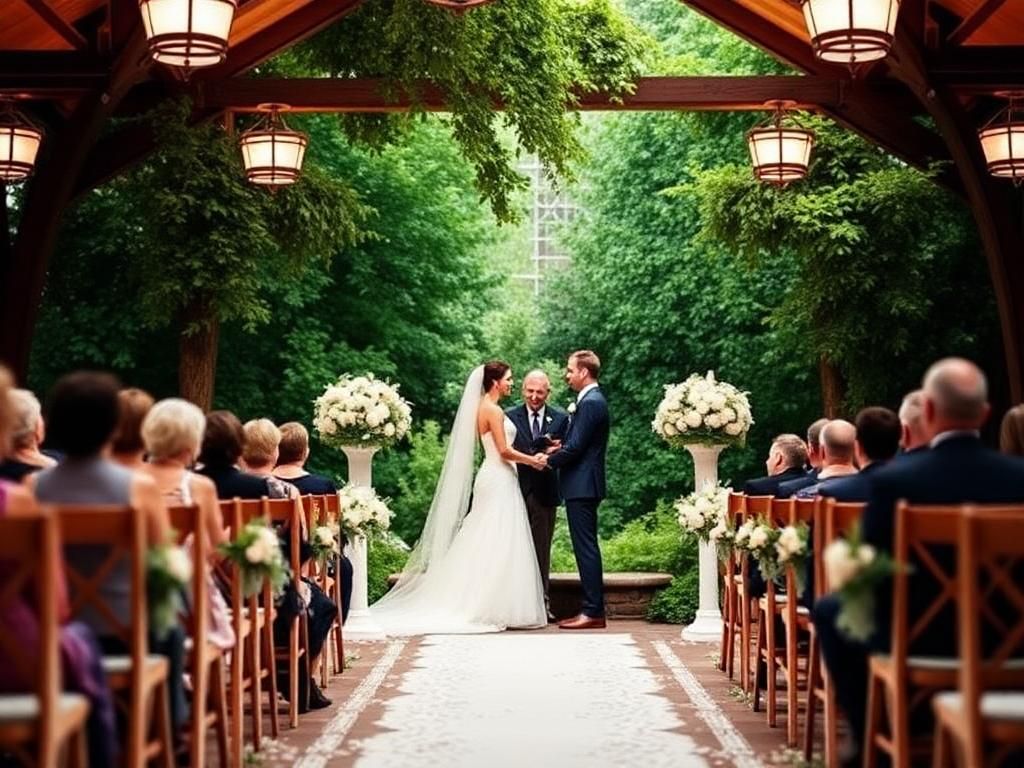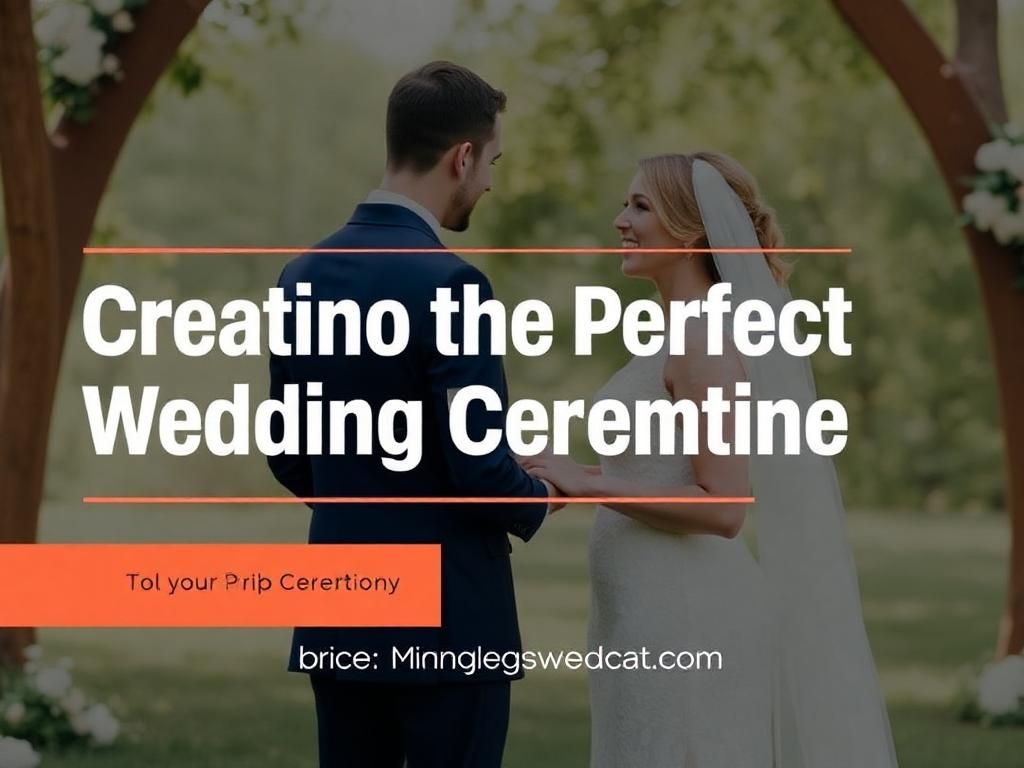A wedding ceremony is a beautiful and significant event that marks the union of two individuals in love. It is a time for family, friends, and cherished moments, but without a structured plan, this joyous occasion can become overwhelming. Having a comprehensive wedding ceremony outline is crucial for ensuring that every detail is covered, enabling the couple to focus on what truly matters—their commitment to each other. This article will guide you through the essential aspects of planning a wedding ceremony, providing you with practical tips, unique ideas, and troubleshooting strategies to create a memorable celebration.
Pre-Ceremony Planning
Setting a Date and Venue
Choosing the right date and venue is fundamental to your wedding ceremony outline. The timing of your wedding can influence many aspects, including guest availability and the ambiance of your celebration. Popular wedding months often lead to higher venue costs and limited availability, so selecting a date during the off-peak season may save you money while providing a unique experience.
When considering the venue, think about its capacity, accessibility, and the atmosphere it creates. Outdoor settings, historical buildings, and local parks can each bring a distinctive feel to your ceremony. Make sure the venue aligns with your vision, whether it’s elegant, rustic, or modern.
Budgeting for the Ceremony
A critical component of your wedding ceremony outline is budgeting. Typical costs associated with wedding ceremonies can vary greatly, but you should anticipate expenses related to the venue, officiant, decor, flowers, and more. To avoid overspending, create a detailed budget that includes all potential costs.
One savvy tip for saving money is to prioritize essentials while being open to alternatives. For instance, consider seasonal flowers for your bouquet and arrangements, or explore DIY options for decorations that reflect your personal style without breaking the bank.
Guest List Preparation
Your guest list is a vital aspect to consider during your wedding ceremony planning. Determining the size of your wedding can be a delicate balance of budget, venue capacity, and personal preferences. To create your guest list, start by brainstorming all key family and friends, and then allocate space for acquaintances based on budgeting constraints.
To make the task less daunting, use a spreadsheet that categorizes your guest list into must-invite, should-invite, and optional guests. This will help you manage expectations and allow for easy adjustments.
Legal Requirements
Every couple must navigate the legalities of marriage in their respective locations. The process typically begins with applying for a marriage license—which often comes with its own set of fees and requirements. Research what documents you’ll need (ID, residency, etc.) and allow sufficient time for processing.
Additionally, consider any religious or cultural prerequisites you may want to honor during your ceremony. From premarital counseling sessions to specific rituals, these elements can enhance the depth and significance of your celebration.
Ceremony Elements
Processional
The processional marks the official beginning of your wedding ceremony and holds deep significance. Traditionally, the order goes as follows: bridesmaids, groomsmen, flower children, the bride, and finally, the groom.
Consider your music selection thoughtfully, as the right song can set the mood and create an emotional backdrop for this meaningful moment.
Welcome and Opening Remarks
The officiant plays a pivotal role in creating an atmosphere of love and connection during the ceremony. This is the perfect time to incorporate personal touches or share stories about how the couple met or their journey together.
Opening remarks are an opportunity to engage the audience and make everyone feel part of the celebration. A heartfelt welcome helps foster a sense of community among your guests.
Readings and Special Tributes
Incorporating meaningful readings and tributes adds depth to your wedding ceremony outline. Whether it’s a favorite poem, a passage from a book, or a personal letter, selecting readings that resonate with both partners is essential.
Invite family or close friends to participate in the ceremony by reading these selections. Not only does it make your ceremony unique, but it also fosters deeper connections among everyone present.
Exchange of Vows
The vow exchange can be one of the most memorable moments of your ceremony. Couples can choose to go the traditional route or incorporate personalized vows that reflect their unique relationship.

If you opt for personalized vows, consider jotting down your thoughts and emotions to incorporate into your promises. The more heartfelt and authentic, the more memorable this moment will be.
Exchange of Rings
The exchange of rings symbolizes eternal love and commitment, making it a central part of your wedding ceremony outline. Discuss what style you’d prefer for the ring exchange, whether it follows a traditional procedure or introduces unique variations.
Hold the rings in a designated spot, such as a special pillow or your officiant’s hands, to ensure they are safe until the moment arises.
Unity Ceremony
A unity ceremony represents the joining of two lives into one. Popular varieties include sand ceremonies, candle lighting, and tree planting. Each option carries its own symbolism and significance.
Choose a unity ceremony that resonates with you as a couple, allowing you to reflect on your shared values and the life you’re starting together.
Ceremony Closure
Pronouncement of Marriage
The officiant’s pronouncement of marriage is the moment everyone has been waiting for. It’s important to make this moment memorable not just for the couple but also for the audience. Including engaging elements like cheers or heartfelt acknowledgments can enhance this moment of celebration.
Consider including a creative or playful note from the officiant that encapsulates your love story, adding a personal flair.
Recessional
The recessional marks the official end of the ceremony, as the couple exits together. A traditional order often follows the bridal party, family, and guests. Your choice of music can set a celebratory tone—so choose songs that represent joy and happiness.
Have fun as you make your exit together, soaking in the moment while inviting your guests to join in the celebration.
Post-Ceremony Activities
After the ceremony, it’s essential to plan for photographs and additional activities, such as a receiving line. A well-thought-out timeline ensures all parties are aware of where to go and when, reducing confusion and maximizing your time together.
Consider organizing the photo shoot with your photographer ahead of time to capture these moments naturally and avoid delays.
Personal Touches and Unique Ideas
Cultural and Religious Traditions
Incorporating cultural and religious traditions into your wedding ceremony can make it even more personalized and meaningful. Depending on your background, consider including significant cultural elements or rituals that honor your heritage.
For example, many couples participate in a “Ketubah” signing in a Jewish wedding or a “Sand Ceremony” in beach weddings, allowing them to share their cultural identities with their guests.
Customization Options
Personalizing your vows, readings, and decor is an ideal way to make your wedding ceremony truly yours. Select floral arrangements or decorations that visually reflect your personalities and the love you share.
Consider using photos or symbols from your relationship as part of your decor. You can also incorporate handwritten notes on programs or decorations to give each guest a unique experience.

Eco-Friendly Ceremonies
As sustainability becomes increasingly important, consider opting for eco-friendly options in your wedding ceremony. From biodegradable confetti and potted plants to locally sourced flowers, countless ways can help reduce waste and minimize your environmental impact.
Engage in dialogue with your vendors about sustainable practices, ensuring your wedding honors both your love and the planet.
Troubleshooting Common Issues
Weather Contingencies
If you’ve chosen an outdoor venue, prepare for potential weather challenges. It’s wise to have a backup plan—involvement of a tent, indoor option, or even a post-phone call to guests to inform them about weather-related changes.
Monitoring local forecasts leading up to your wedding can help you anticipate conditions and execute the backup plan if necessary.
Dealing with Difficult Guests
Weddings can sometimes stir up emotions among guests, leading to unexpected drama or conflict. To maintain a smooth celebration, strategize how to manage potential issues beforehand.
Consider designating a trusted family member or friend as a mediator, capable of addressing concerns and irregularities during the ceremony.
Last-Minute Changes
It’s common to encounter last-minute changes, whether due to vendor delays or family emergencies. The key to responding positively lies in remaining calm and adaptable.
Develop a “Plan B” for possible scenarios—such as seating arrangements or music selections—ensuring that everyone involved knows the contingency plan.
| Section | Key Points |
|---|---|
| Pre-Ceremony Planning | Set a date and venue, budget, guest list, legal requirements |
| Ceremony Elements | Processional, vows, unity ceremony, ring exchange |
| Ceremony Closure | Pronouncement of marriage, recessional, post-ceremony activities |
| Personal Touches | Incorporate traditions, customization options, eco-friendliness |
| Troubleshooting | Weather contingencies, managing guests, adaptation strategies |
FAQ
What is the purpose of a wedding ceremony outline?
A wedding ceremony outline serves to guide couples through the planning process, ensuring that every critical aspect is covered while allowing for personalization.
How should we choose our ceremony venue?
Select a venue based on your budget, size requirements, and atmosphere preferences. Booking early ensures better availability.
Can we personalize our vows?
Yes! Couples often choose to write personalized vows to express their unique relationship and commitment to one another.
What if it rains on our wedding day?
Have a backup plan for your ceremony with potential indoor options or tents for outdoor venues.
Are there benefits to hiring a wedding planner?
A wedding planner can help streamline the process, manage the details, and alleviate stress, making your wedding day more enjoyable.
How do we manage a difficult guest?
Designate a trusted person to handle any potential issues discreetly, keeping communication clear and resolving matters efficiently.
Is it possible to have an eco-friendly wedding ceremony?
Absolutely! Consider sustainable options such as biodegradable confetti, locally sourced flowers, and minimal waste decor.
What readings should we choose for our ceremony?
Select readings that resonate with you as a couple, whether it’s poetry, a song, or meaningful scripture.
When should we finalize our guest list?
Aim to finalize your guest list at least two to three months before the wedding to ensure sending invitations and making necessary arrangements.
How can we keep our wedding budget in check?
Create a detailed budget, prioritize essential elements, and remain flexible with alternatives to reduce costs without sacrificing quality.
By following this comprehensive wedding ceremony outline, you will not only maintain a well-organized plan for your big day but also create a truly memorable celebration tailored to your style and love story.


